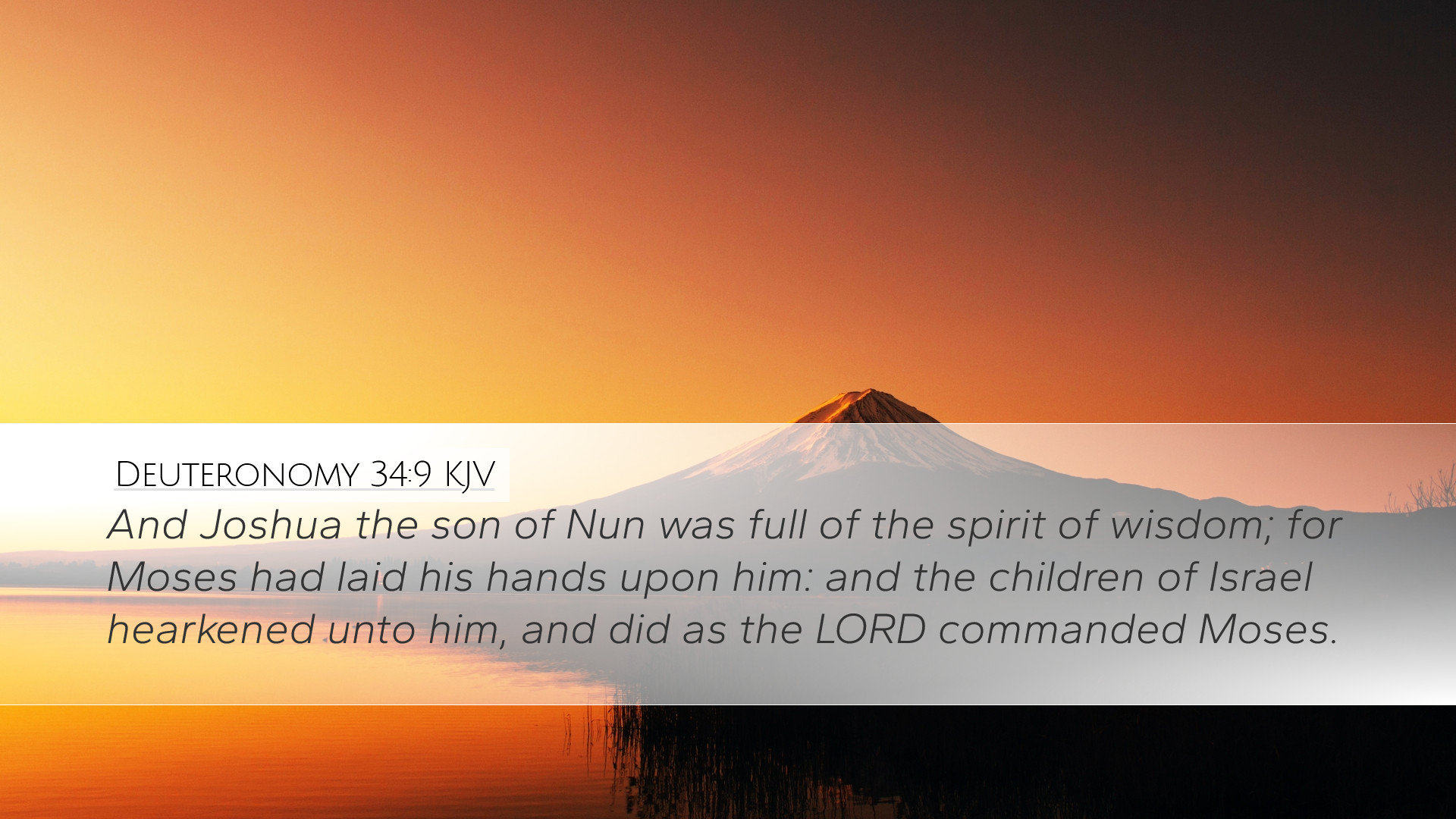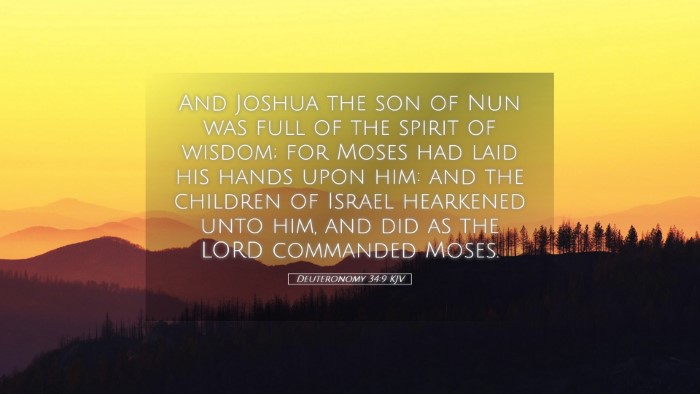Commentary on Deuteronomy 34:9
Biblical Text: "Now Joshua the son of Nun was full of the spirit of wisdom, for Moses had laid his hands on him; and the children of Israel heeded him, and did as the Lord had commanded Moses." (Deuteronomy 34:9, NKJV)
Overview
The closing chapter of Deuteronomy serves as a profound transition point in biblical history. The death of Moses marks the end of an era, and the subsequent leadership of Joshua signifies a new beginning. This verse encapsulates the divine appointment of Joshua, emphasizing the importance of spiritual wisdom and continuity in leadership.
Insights from Public Domain Commentaries
Matthew Henry's Commentary
Henry emphasizes the significance of Joshua's character in this verse. He notes that Joshua is described as "full of the spirit of wisdom," indicating not only his intellectual capabilities but also his spiritual insight. Moses' act of laying hands on Joshua symbolizes the transfer of authority and divine approval, highlighting the necessity of wise leadership in God’s people.
- Divine Selection: Henry notes that Joshua's wisdom is not inherent but a gift from God, affirming that true leaders are those empowered by the Holy Spirit.
- Continuation of God’s Plan: The people’s response to Joshua—"the children of Israel heeded him"—reflects their recognition of God's hand in this leadership transition.
Albert Barnes' Notes on the Bible
Barnes provides insight into the significance of Joshua’s anointing. He underscores that Joshua’s success is directly linked to the guidance and obedience to God's commands as demonstrated through Moses. The public recognition of Joshua by the Israelites indicates their acceptance of divine order.
- Spirit of Wisdom: Barnes elaborates on the "spirit of wisdom," suggesting that this wisdom is both practical and theological, equipping Joshua to lead with discernment and an understanding of God’s covenant.
- Heeding Joshua: The phrase "the children of Israel heeded him" signifies the importance of communal acceptance in leadership and obedience to God’s chosen leaders.
Adam Clarke's Commentary
Clarke highlights the process through which Joshua acquired wisdom, emphasizing that it was through association with Moses and the formative experiences of leading Israel. His commentary showcases the role of mentorship and preparation in leadership.
- Mentorship: The laying on of hands represents a transfer not only of authority but of knowledge and experience from Moses to Joshua.
- Wisdom in Leadership: Clarke remarks on the necessity of wisdom in leadership, particularly in guiding God’s people through the challenges they faced in the Promised Land.
Theological Implications
This verse invites deeper theological reflection on themes of leadership, succession, and the movement of God's people. It demonstrates how divine wisdom is essential for guiding communities and underscores the importance of recognizing and following God-chosen leaders.
Leadership Dynamics
The transition from Moses to Joshua reveals crucial dynamics in leadership. Moses is portrayed as the exemplary leader who is obedient to God’s instructions, and through his mentorship, Joshua is prepared to lead with a similar spirit.
- Effective Leadership and Discipleship: It raises the question of how current leaders are to prepare successors, highlighting the need for intentional discipleship.
- Importance of Congregational Support: The acceptance by the Israelites illustrates the communal responsibility in recognizing and supporting God’s appointed leaders.
Messianic Foreshadowing
Interestingly, Joshua’s role can be viewed as a type of Christ—both share the characteristic of leading God’s people into the Promised Land, signifying salvation and divine promise. The Hebrew name “Joshua” is closely related to “Jesus,” both meaning "the Lord saves."
Practical Applications for Pastors and Theologians
The insights derived from Deuteronomy 34:9 offer several practical applications for pastoral leaders and theological scholars:
- Seeking Divine Wisdom: Pastors should continuously seek God's wisdom through prayer and scripture, ensuring they lead with divine guidance.
- Mentoring Future Leaders: There is a critical call for established leaders to invest in mentoring the next generation of leaders, ensuring a transfer of wisdom and values.
- Community Engagement: It is essential for church leadership to actively engage their communities, fostering an environment where congregants can heed and support their leaders.
- Embodying Christ-like Leadership: Reflecting on Joshua's leadership style, pastors and theologians should strive to embody qualities of humility, wisdom, and faithfulness in their ministry.
Conclusion
Deuteronomy 34:9 is not merely a historical account but a rich source of theological reflection. The characteristics of Joshua serve as a model for contemporary leadership within the church. As leaders today navigate the complexity of ministry, this verse serves as a reminder of the integral role of wisdom, succession, and the importance of divine affirmation in leadership.


